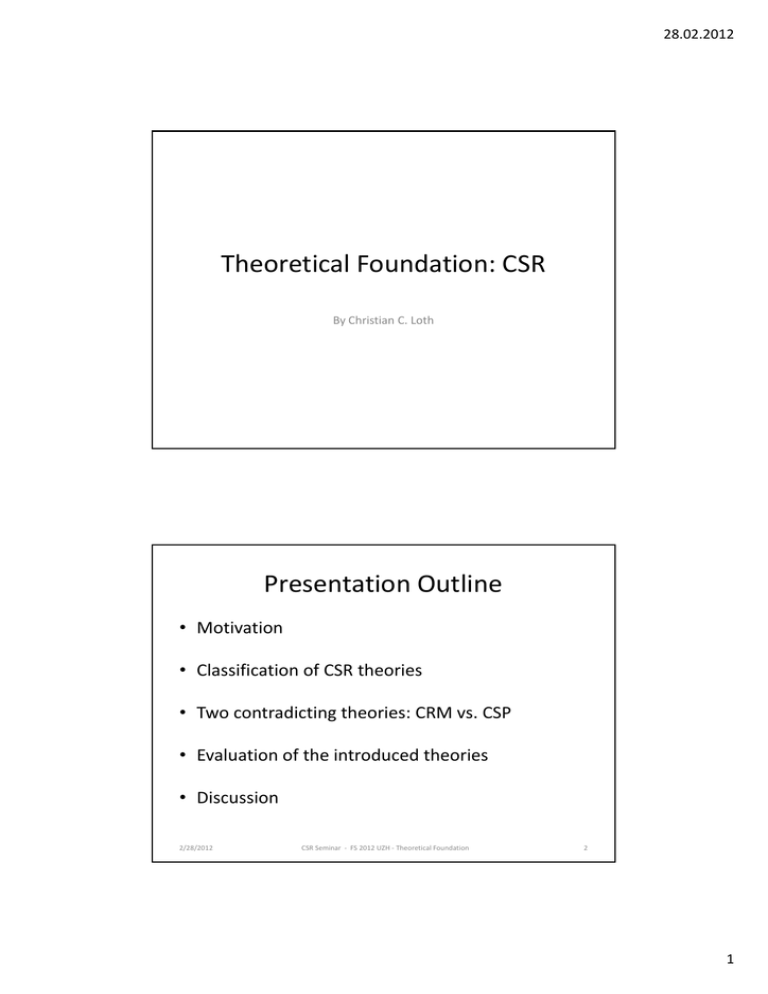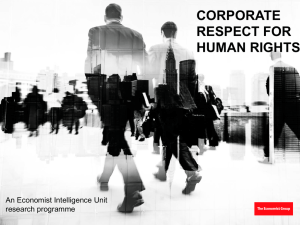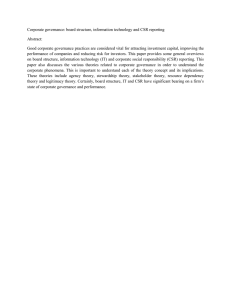Theoretical Foundation: CSR Presentation Outline
advertisement

28.02.2012 Theoretical Foundation: CSR By Christian C. Loth Presentation Outline • Motivation • Classification of CSR theories • Two contradicting theories: CRM vs. CSP • Evaluation of the introduced theories Evaluation of the introduced theories • Discussion 2/28/2012 CSR Seminar ‐ FS 2012 UZH ‐ Theoretical Foundation 2 1 28.02.2012 MOTIVATION 2/28/2012 CSR Seminar ‐ FS 2012 UZH ‐ Theoretical Foundation 3 Practical problems http://www.nytimes.com/2007/12/10/world/asia/10sk orea.html http://verbalmedicine.files.wordpress.com/2010/05/nike‐ sweatshops.jpg http://www.nytimes.com/2012/01/1 9/world/africa/report‐finds‐slow‐ response‐to‐east‐africa‐ famine.html?_r=1 2/28/2012 http://green.blogs.nytimes.com/2010/12/02/def orestation‐slows‐as‐brazil‐chugs‐toward‐a‐goal/ CSR Seminar ‐ FS 2012 UZH ‐ Theoretical Foundation 4 2 28.02.2012 CSR Development Beginning of CSR era 1950’ CSR literature expands 1960’ more and more definitions 1970’ Frameworks, attempts to measure New themes: Stakeholders, Business ethics, Corporate Citizenship… 1980’ 1990’ (Carroll 1999) 2/28/2012 CSR Seminar ‐ FS 2012 UZH ‐ Theoretical Foundation 5 “Perhaps the best way to understand social responsibility is to think of it as ‘good “Social responsibility usually refers to the neighborliness.’ The concept involves two phases. objectives or motives that should be given For purposes of this discussion it [CSR] refers to the “…social responsibility in business is the pursuit of “In short, the newconcept of social responsibility On one hand, it means not doing things that spoil weight by business in addition “I take responsibility to mean a condition in which the firm’s consideration socioeconomic goals through the elaboration of social recognizes the intimacy of the neighborhood. On the other, it may be “Social responsibility, therefore, refers to a person’s obligation to to those dealing with economic “[Social responsibilities] mean that businessmen should oversee corporation is at least in some measure a free agent. of, and response to, issues beyond the narrow norms in prescribed business roles; or, to put it more the relationships between the corporation and society expressed as the voluntary assumption of the consider´the effects of his decisions and actions on the whole performance…” ( Backman 1975, p.2, cited by the operation To the extent that any of the foregoing social “The idea of social responsibilities supposes that the corporation has economic, technical, and legal simply, business takes place within a socio‐cultural system and realizes that such gare pon the obligation to help solve neighborhood y system pp pgcertain y law they social system. Businessmen apply social responsibility when they ((Carroll 1999, p.279) , pyexpectations ) (Davis “It It refers to the obligations of businessmen to pursue refers toof an economic system that fulfills the expectations of the public. the ofobjectives are imposed on the corporation by law, the businessmen toof pursue of anobligations economic that fulfills the public objectives imposed not not only economic and legal obligations but also certain only economic and legal obligations but requirements requirements of the firm. (Davis,1973, p. 312) the firm 1973 th that outlines through norms and business roles particular t tli th hthe dalso bcorporation i of lpby312) ti l relationships must be kept in mind by top managers as “businessmen’s decisions and actions taken for reasons at least problems….” (Eilbert & Parket, 1973, p. 7) consider the needs and interest of others who may be affected by those policies, to make those decisions, or to follow those lines of And this means in turn that the economy’s means of production corporation exercises no responsibility when it responsibilities to society which extend beyond these obligations” ways of responding to particular situations and sets out in the corporation and partially beyond the firm’s direct economic or technical interest” business actions. In so doing, they look beyond their firm’s narrow action which are desirable in terms of the objectives and values of should be employed in such a way that production and implements them.” (Manne & Wallich, 1972, p. 40) (Joseph W. McGuire, 1963 p. 144). some detail the prescribed ways of conducting business the related groups pursue their respective goals.” (Davis, 1960, p. 70) economic and technical interests.” (Keith Davis and Robert our society” (Bowen 1953 p.6) distribution should enhance total socio‐economic welfare…” affairs.” (Johnson, 1971, p.51) (Walton, 1967, p. 18) Blomstrom, 1966 p. 12) (Frederick, 1960, p. 60) Theoretical Problems 1950’ H. Bowen (Carroll 1999) 2/28/2012 1960’ K. Davis W. C. Frederick J. W. McGuire R. Blomstrom C. C. Walton 1970’ 1980’ H. Johnson (x3) H Johnson (x3) … H. G. Manne & H. C. Wallich K. Davis Eilbert & Parket J. Backman S. P. Sethi Preston & Prost Fitch Zeniseck CSR Seminar ‐ FS 2012 UZH ‐ Theoretical Foundation Carroll 1990’ … 6 3 28.02.2012 Too many definitions ?! “it means something but not always the same thing, to everybody” (Votaw 1973, p.11) Classification 2/28/2012 CSR Seminar ‐ FS 2012 UZH ‐ Theoretical Foundation 7 CLASSIFICATIONS OF CSR THEORIES 2/28/2012 CSR Seminar ‐ FS 2012 UZH ‐ Theoretical Foundation 8 4 28.02.2012 Different Classifications • CSR 1‐4 based on conceptual transition by William C Frederick (Frederick 1987 1998) William C. Frederick (Frederick 1987, 1998) • Focus on interaction between business and society by Elisabeth Garriga and Domènec Melé (Garringa and Melél 2004) • Concept tree for Corporate Citizenship by Sandra Waddock (Waddock 2008) (Garringa and Melé 2004) 2/28/2012 CSR Seminar ‐ FS 2012 UZH ‐ Theoretical Foundation 9 Garringa and Melé Classification Idea: Business Roots: four aspects of social systems of social systems by Parsons Society Society Economic aspects Political aspects (corporation p ( p has social duties and rights…) Social integration (Garringa and Melé 2004) 2/28/2012 Ethic values CSR Seminar ‐ FS 2012 UZH ‐ Theoretical Foundation 10 5 28.02.2012 CSR Theories: Four groups Instrumental Political • CSR: means to the end (=economic objectives) • P Power of corporations f ti ‐> responsibility Integrative Ethical • Business depends on society ‐> should integrate social demands • CSR as ethical obligation • Political analysis / consideration (Garringa and Melé 2004) 2/28/2012 CSR Seminar ‐ FS 2012 UZH ‐ Theoretical Foundation 11 Instrumental Theories • Milton Friedman: ‘‘the only one responsibility of business towards society is the fb i t d i t i th maximization of profits to the shareholders within the legal framework and the ethical custom of the country’’ ( Friedman 1970, cited by: Garriga and Melé 2004, p. 53) 2/28/2012 CSR Seminar ‐ FS 2012 UZH ‐ Theoretical Foundation 12 6 28.02.2012 Instrumental Theories – three groups • Maximizing shareholder value (Friedman 1970 Jensen and Meckling 1967) 1970, Jensen and Meckling 1967) • Strategies for achieving competitive advantages – e.g. Strategies for the bottom of the pyramid, (P h l d 2002, Hart and Christiansen 2002) (Prahalad 2002 H d Ch i i 2002) • Cause‐related marketing (CRM) (Garringa and Melé, 2004) 2/28/2012 CSR Seminar ‐ FS 2012 UZH ‐ Theoretical Foundation 13 Political Theories • Corporate Constitutionalism / Davis’ two laws – Social power equation: Social power ‐> social responsibilities – Iron law of responsibilities using social power irresponsibly ‐> loosing it (Davis 1967) • Integrative social contract theory – Macrosocial (Hypernorms) and Microsocial level (D (Donaldson and Dunfee ld d D f 2000) • (Global) Corporate citizenship [next week] – Reaction to rising power of MNC (Garringa and Melé 2004) 2/28/2012 CSR Seminar ‐ FS 2012 UZH ‐ Theoretical Foundation 14 7 28.02.2012 Integrative Theories • Issues Management – “process for making a corporate response to a social issue” (G i (Garringa and Melé d M lé 2004 p.58) 2004 58) • The principles of social public responsibility – stresses ‘public process’ not personal morality view – Law + ‘social direction’ (Preston and Post 1981) • Stakeholder management Stakeholder management • Corporate Social Performance (CSP) (Garringa and Melé 2004) 2/28/2012 CSR Seminar ‐ FS 2012 UZH ‐ Theoretical Foundation 15 Ethical Theories • Normative Stakeholder theory – R. E. Freeman R E Freeman • Universal Rights – UN Global Compact • Sustainable development – Triple bottom line • Common good approach (Garringa and Melé, 2004) 2/28/2012 CSR Seminar ‐ FS 2012 UZH ‐ Theoretical Foundation 16 8 28.02.2012 TWO CONTRADICTING THEORIES 2/28/2012 CSR Seminar ‐ FS 2012 UZH ‐ Theoretical Foundation 17 Cause‐related marketing “the practice of marketing a product, service, b d brand, or company through a mutually th h t ll beneficial relationship with a non‐profit or social cause organization” (Berglin and Nakata 2005 p. 444) 2/28/2012 CSR Seminar ‐ FS 2012 UZH ‐ Theoretical Foundation 18 9 28.02.2012 CRM = win‐win ? Business • • • • • NPO Profits Brand Reputation Goodwill Employee moral and retention • Funding • Exposure & message efficacy • Non financial resources (Berglin and Nakata 2005) 2/28/2012 CSR Seminar ‐ FS 2012 UZH ‐ Theoretical Foundation 19 CRM examples http://standrew‐parish.com/cause‐related‐ marketing.html http://www.pinklotusbreastcenter.com/breast‐cancer‐101/wp‐ content/uploads/2010/04/kfc‐pink‐bucket.jpg Pink buckets: April 14th to May 23rd 2010 ‐> over 4.2 m $ donation (http://ww5.komen.org/KomenNewsArticl e.aspx?id=6442452377) 2/28/2012 http://bonner bonner‐wirtschaftsgespraeche wirtschaftsgespraeche.de/wp de/wp‐ content/uploads/Image/KeyVisual_RW‐%283%29.jpg Cost of the campaign: 8‐9m € 1m € for WWF 1m € million for Günther Jauch (http://www.spiegel.de/spiegel/print/d‐ 47134772.html) CSR Seminar ‐ FS 2012 UZH ‐ Theoretical Foundation 20 10 28.02.2012 Corporate Social Performance (CSP) • CSP = CSR + Corporate Social Responsiveness + socially beneficial activities “…emphasizes concern for corporate action and accomplishments in the social sphere” (Carroll 1991 40) 1991 p.40) (Carroll 1991) 2/28/2012 CSR Seminar ‐ FS 2012 UZH ‐ Theoretical Foundation 21 CSR ‐ Pyramid (close to CSP) expected from society necessary conditions (Carroll 1991, Introduction CSR Seminar UZH 2012) 2/28/2012 CSR Seminar ‐ FS 2012 UZH ‐ Theoretical Foundation 22 11 28.02.2012 EVALUATION OF THEORIES 2/28/2012 CSR Seminar ‐ FS 2012 UZH ‐ Theoretical Foundation 23 CSR increase vs. “blue‐washing” United Nations Global Compact Annual Review 2010 2/28/2012 CSR Seminar ‐ FS 2012 UZH ‐ Theoretical Foundation 24 12 28.02.2012 Ethical issues and social implications of CRM • differing interests ‐> compromises goals • advocacy or exploitation? • too little transparency? • disadvantaging disadvantaging “less less attractive attractive” causes causes • desensitization ‐> CRM grants decline without traditional giving regenerating (Berglin and Nakata 2005, Smith and Higgins 2000) 2/28/2012 CSR Seminar ‐ FS 2012 UZH ‐ Theoretical Foundation 25 Globalization changes everything… • Scherer and Palazzo (2011): globalization changes the role of businesses 2/28/2012 CSR Seminar ‐ FS 2012 UZH ‐ Theoretical Foundation 26 13 28.02.2012 DISCUSSION 2/28/2012 CSR Seminar ‐ FS 2012 UZH ‐ Theoretical Foundation 27 CRM or CSP ? Integrative or instrumental? … Or ethical? 2/28/2012 CSR Seminar ‐ FS 2012 UZH ‐ Theoretical Foundation 28 14 28.02.2012 CSR = utopia ? “the CSR firm should strive to make profit, obey the law, be ethical, and be good b th l b thi l d b d corporate citizen” (Carroll 1991, p.43) (Carroll, 1991) 2/28/2012 CSR Seminar ‐ FS 2012 UZH ‐ Theoretical Foundation 29 Does the instrumental view enable green‐ / blue‐ washing? 2/28/2012 CSR Seminar ‐ FS 2012 UZH ‐ Theoretical Foundation 30 15 28.02.2012 references Berglind, M./ Nakata, C. (2005): Cause‐related marketing: More buck than bang?, in: Business Horizon, Vol.48, pp. 443 – 453. Carroll, A.B. (1991): The Pyramid of Corporate Social Responsibility: Toward the Moral Management of Organizational Stakeholders, in: Business Horizons, Vol. 34, No.4, pp. 39 – 48. Carroll, A.B. (1999): Corporate Social Responsibility Evolution of a Definitional Construct, in: Business & Society, Vol.38, No.3, pp. 268 – 295. Davis, K. (1967): Understanding The Social Responsibility Puzzle, in: Business Horizons, Vol.10, No.4, pp. 45 – 51. Donaldson, T./ Dunfee T. W. (2000): Pre´cis for Ties that Bind, in: Business and Society, Vol. 105, pp. 436 – 444. Friedman, M. (1970): The Social Responsibility of Business is to Increase its Profits, in: New York Times Magazine, September 13th, pp. 32 – 33. Garriga, E./Melé, D. (2004): Corporate Social Responsibility Theories: Mapping the Territory, in: Journal of Business Ethics , Vol.53, pp. 51 – 57. Hart, S. L./Christensen C. M. (2002): The Great Leap. Driving Innovation from the Base of the Pyramid, in: MIT Sloan Management Review, Vol.44, No.1, pp. 51 – 57. 2/28/2012 CSR Seminar ‐ FS 2012 UZH ‐ Theoretical Foundation 31 references Jensen, M. C./ Meckling W. (1976): Theory of the Firm: Managerial Behavior, Agency Cost, and CapitalStructure, in: Journal of Financial Economics Vol.3, pp. 305 – 360. Prahalad, C. K. (2002): Strategies for the Bottom of the Economic Pyramid: India as a Source of Innovation Reflections, in: The SOL Journal, Vol.3, No.4, pp. 6 – 18. Preston, L. E./ Post J. E. (1981): Private Management and Public Policy, in: California Management Review, Vol.23, No.3, pp. 56 – 63. 63 Scherer, A.G. /Palazzo, G. (2011): The new political role of business in a globalized world: A review of a new perspective on CSR and its implications for the firm, governance, and democracy, in: Journal of Management Studies, Vol.48, No.4, pp. 899 ‐ 931. Smith, W/ Higgins M. (2000): Cause‐Related Marketing: Ethics and the Ecstatic, in: Business and Society, Vol.39, No.3, pp. 304 – 322. Votaw, D. (1973): Genius becomes rare. In: D. Votaw & S. P. Sethi (Eds.): The corporate dilemma. Englewood Cliffs, NJ: Prentice Hall. Waddock, S. (2008): Corporate Responsibility/Corporate Citizenship: The Development of a Construct. In: Scherer, A.G./Palazzo, G. (Eds.): Handbook of Research on Global Corporate Citizenship, Cheltenham, pp. 25 – 49. KFC Presents to Susan G. Komen for the Cure® a Check for more than $4.2 Million: Single Largest Donation in Organization’s History, http://ww5.komen.org/KomenNewsArticle.aspx?id=6442452377 y, p // g/ p retrieved on Feb. 27th 2012. Kritik an Krombacher, in: Der Spiegel, June 3rd 2006, http://www.spiegel.de/spiegel/print/d‐47134772.html retrieved on Feb. 27th 2012. United Nations Global Compact Annual Review 2010, http://www.unglobalcompact.org/docs/news_events/8.1/UN_Global_Compact_Annual_Review_2010.pdf , retrieved on Feb 27th 2012. 2/28/2012 CSR Seminar ‐ FS 2012 UZH ‐ Theoretical Foundation 32 16




